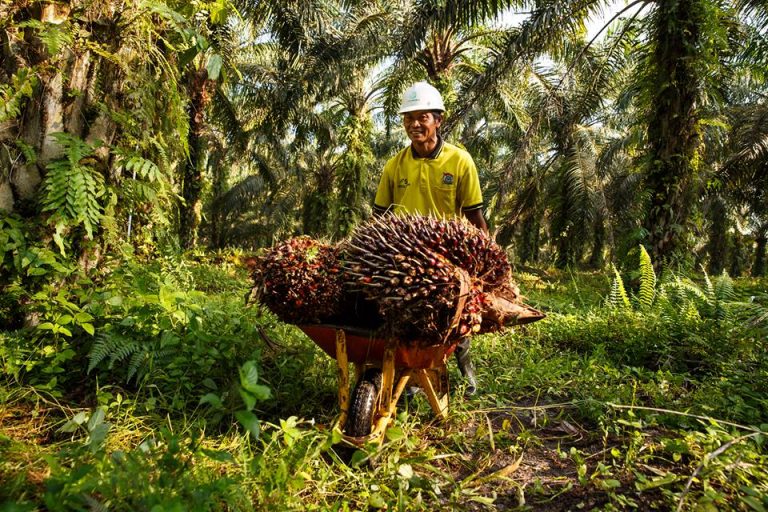Who are we
In response to the urgent and pressing global call for sustainably produced palm oil, the Roundtable on Sustainable Palm Oil (RSPO) was formed in 2004 with the objective promoting the growth and use of sustainable oil palm products through credible global standards and engagement of stakeholders.
The seat of the association is in Zurich, Switzerland, while the secretariat is currently based in Kuala Lumpur with a satellite office in Jakarta.
RSPO is a not-for-profit association that unites stakeholders from seven sectors of the palm oil industry – oil palm producers, palm oil processors or traders, consumer goods manufacturers, retailers, banks and investors, environmental or nature conservation NGOs and social or developmental NGOs – to develop and implement global standards for sustainable palm oil.
Such multi-stakeholder representation is mirrored in the governance structure of RSPO such that seats in the Executive Board and project level Working Groups are fairly allocated to each sector. In this way, RSPO lives out the philosophy of the “round-table” by giving equal rights to each stakeholder group to bring group-specific agendas to the round-table, facilitating traditionally adversarial stakeholders and business competitors to work together towards a common objective and making decisions by consensus.
Volunteer Information
Agriculture has changed the relationship between man and nature more than anything else and forever. As the world population continues to rise agriculture will continue to expand to feed, cloth and protect mankind. The largest expansions will be in the tropics where favourable climatic conditions can give high agricultural productivity. The tropics have now emerged as the world’s foremost supplier of edible oils, made possible by modern cultivation of the earth’s most precocious edible oil bearing plant – the oil palm or Elaeis guineensis Jacq. The oils it produces, palm oil and palm kernel oil, are versatile food products with a wide range of uses. They are also a greener substitute for petrochemicals in some applications.
The rise in demand for food, including edible oils, with increasing population and higher standards of living, as pushed to demand for palm oil. The result has been very rapid expansion of this crop in the tropics particular in Malaysia in the second half of the last century and in Indonesia at the turn of this century. Rapid expansion naturally rapidly exerts pressure, in this case on the environment – including biodiversity rich lands – and on the social fabric. Issues of deforestation and biodiversity loss, trampling of land rights, etc. are bound to rise. The RSPO is a unique multi-stakeholder platform to address the expansion of palm oil without undue pressure on the environment and society.
More on RSPO
RSPO is a non-for profit organisation aimed “at promoting the production and use of sustainable palm oil through co-operation within the supply chain open dialogue between its stakeholders”. On 8 April 2004, the “Roundtable on Sustainable Palm Oil (RSPO),” was formally established under the Swiss Civil Code with a governance structure that ensures fair representation of all stakeholders throughout the entire supply chain. The seat of the association is in Zurich, Switzerland, while the secretariat is in Kuala Lumpur. The RSPO Indonesia Liaison Office was established in December 2006 to promote the overall objectives of the RSPO in Indonesia. The office, among others, assists in the implementation and monitoring progress of the RSPO projects in Indonesia, facilitate for the inclusion of smallholders in RSPO processes in Indonesia and provide guidance to Indonesian companies seeking for RSPO certification.
Our activities
The not-for-profit association has members representing major players along the palm oil supply chain, namely the oil palm growers, palm oil processors and traders, consumer goods manufacturers, retailers, banks and investors, environmental/nature conservation NGOs and social/development NGOs. The RSPO recognises that palm oil is an important and versatile raw material for both food and non-food industries, which contributes to the economic development of the producing countries and to the diets of millions of people around the world. However, it believes that production and use of palm oil must be done in a sustainable manner based on economic, social and environmental viability. Towards this end, the RSPO is promoting the production and use of sustainable palm oil through the following activities:
National Interpretation of RSPO P&C in Colombia, Thailand, Ghana & Solomon Isles
Continuing approval of Independent Certification Bodies for RSPO P&C and SC certification.
Accreditation of Independent Certification Bodies for RSPO certification
Accreditation of HCV assessors
Development of Biodiversity compensation mechanisms.
Sustainability criteria for Smallholders (scheme and independent)
Group Certification Scheme for smallholders
Trial Audits of scheme smallholders
Procedures around new plantings
GHG criteria for palm oil production
Integrated Weed Management
Supply Chain Certification and supply models
Communications & Claims
Get Involved
You may contribute to this organisation through a number of ways:
Take up membership (refer to the membership section on this website)
Be involved in the various Working Groups and Technical Committees but do respect that your direct participation will be subject to approval by RSPO which will weigh how and what you can contribute irrespective of your desire to do so.
Respond to the various calls for stakeholder comments that periodically appear on the RSPO website, if you have reason to comment and your views are pertinent to the matter.
Contribute to the RSPO newsletter by submitting material that may be interesting and relevant to the RSPO membership.
Give suggestions on how RSPO can be further improved.
Attend the RSPO’s annual meeting or RT.
Roundtable on Sustainable Palm Oil (RSPO)
| [email protected]Email | |
| www.rspo.orgWebsite | |
| +603 4041 1375Phone Number | |
| +603 2302 1542Fax Number | |
| Established since 2004Year of Establishment | |
| Unit A-37-1, Menara UOA Bangsar, No.5 Jalan Bangsar Utama 1, 59000 Kuala Lumpur, MalaysiaAddress |


 Roundtable on Sustainable Palm Oil (RSPO)
Roundtable on Sustainable Palm Oil (RSPO) 
